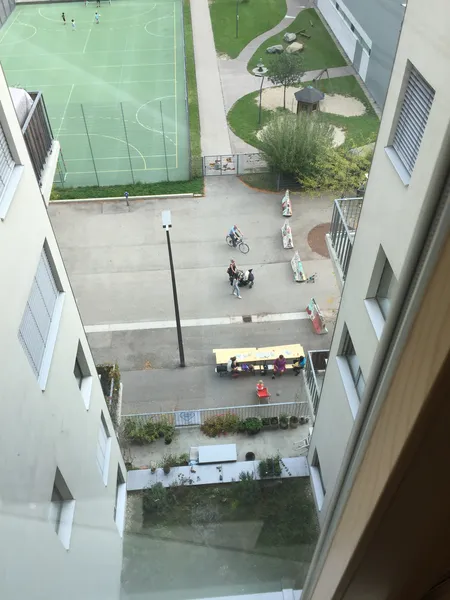Housing for Families in Community and Neighbourhoods: Practices, Resources and Socio-Ecological Transformations (FaGeNa)

The project explores how collaborative housing projects are embedded in neighbourhoods and how these are linked to practices and spatial resources of family housing.
Collaborative Housing often is described as experimental fields for the transformation of care work (Spellerberg 2021) as well as living and urban transformations (Id 2022, Tummers 2016). However, these functions and especially their relationships have not yet been sufficiently empirically researched. The interdisciplinary project researches practices and spatial resources of family housing using the example of selected collaborative housing forms and non-collaborative structured forms of housing and how they are related to neighborhood and the surrounding areas. The project examines, the extent to which collaborative housing contributes to the formation of locally anchored support networks for families and extended families. In doing so, the project combines approaches from family, housing and urban research. The focus is on the interrelation of residential and urban transformations with changed social relationships, a topic that has so far received little attention in research, housing policies and practice. The starting point of the project are societal transformations through which family care increasingly require local networks of care that extend beyond the nuclear family, and through which, at the same time, family housing needs are differentiating and housing forms are changing.
Subproject TP02: within the research cluster "ForFamily", funded by the Bayrischen Forschungsverbünde, in cooperation with Deutsches Jugendinstitut (DJI)
Research Period: Januar 2024 – Januar 2028
Funding: Bayrische Forschungsverbünde
Research Cluster "ForFamily" - „Housing for Families in Community and Neighbourhoods: Practices, Resources and Socio-Ecological Transformations“
In cooperation with the University of Bamberg, FAU Erlangen-Nürnberg, University of Applied Sciences Landshut, HM München University of Applied Sciences, LMU München and the State Institute for Family Research at the University of Bamberg (ifb).
Subproject "Housing for Families in Community and Neighbourhoods: Practices, Resources and Socio-Ecological Transformations (FaGeNa))"
Professorship for Urban Design, Prof. Dr. Benedikt Boucsein
Lead of Subproject TP02:
Dr. Isabel Glogar (project lead)
Maria Schlüter (PhD Researcher, co-project lead)
Ayesha Müller-Wolfertshofer (Research Associate)
Valerie Lemke
Nele Ziegler
Contact: isabel.glogar(at)tum.de, maria.schlueter(at)tum.de, ayesha.mueller@tum.de
Cooperationspartners:
Research Cluster with the Funding of Bayerischen Forschungsverbunds
„ForFamily“
The German Youth Institute (DJI) (Deutsches Jugendinstitut, Fachgruppe Familienpolitik und Familienförderung)
Dr. Martina Heitkötter (projectlead DJI), Dr. Laura Castiglioni, Janine Thiel
Research Cluster Partners:
Technische Universität München
Universität Bamberg
Universität Erlangen-Nürnberg
Hochschule Landshut
Hochschule München
LMU
Staatsinstitut für Familienforschung an der Universität Bamberg
Events
- 22. Juli 2024, 16.30-19.00 Uhr, IBZ München, Public Event and Presentation ForFamily .
- 24. Juni 2024 I Discusssion and Round Table "Gem*einsam Wohnen"
- 12-13. Mai 2025 I ForFamily - Interdisciplinary Research Cluster at TUM